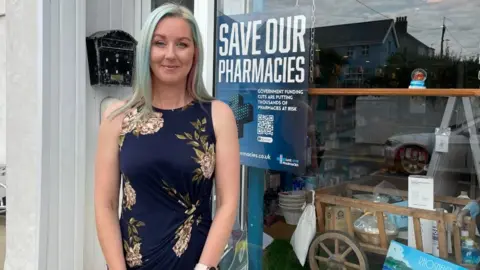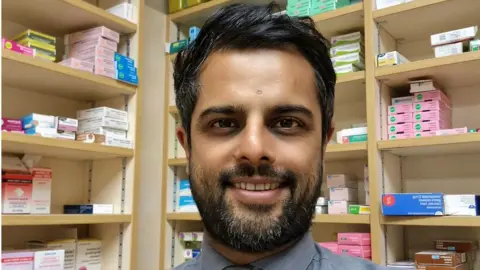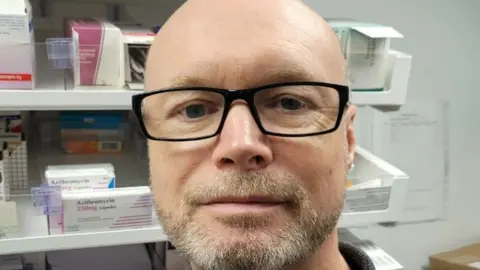Community pharmacists in Wales warn they're close to burnout
 BBC
BBCCommunity pharmacists in Wales have warned they are close to "burnout".
They described being under increased pressure to deliver more services to patients without adequate financial support from the Welsh government.
Wrexham pharmacist Dhimant Patel said the profession was in "a fantastic position" to help reduce pressure on GPs but warned "the funding must follow" to make it happen.
The Welsh government said it was committed to helping the profession.
Community pharmacists - also known as chemists - dispense prescriptions, sell over-the-counter medicines and can give advice on treating minor ailments and certain conditions.
They are contracted by the NHS in Wales and received a 1% increase in funding for 2023-24, a figure described as "insulting" by one business owner.
Jenny White runs The Pharmacy in Rhosneigr, Anglesey, with her husband and said she felt "under a lot of pressure".
As part of her contract, she is required to see patients about their conditions and prescribe certain medicine.
"I've always wanted to help people and that's why I'm a pharmacist," she said.
"But if we continue as we are, we are just unable to give the best service that we can."
Ms White said she could develop the services she offers, but it was "not possible with the funding" she gets.
"The 1% uplift in fees is, quite frankly, not good."
Spending time with patients means Jenny needs staff to backfill the time when she is away from the dispensary.
Employing more staff to check the prescriptions has resulted in bigger financial pressures for the business, she added.
"Anything now that we're not paid for, we are having to seriously consider whether we can viably offer those services."
There are just over 700 community pharmacies in Wales, with about 230 independent and the rest chains, according to Welsh government figures.

Mr Patel welcomed moves for pharmacists to reduce the pressure on GPs.
But, he added: "If we are going to be in a position to help with this workload, then the funding needs to come."
Gareth Rowe, a community pharmacist in Bridgend, said he had seen major changes in his profession over the past 30 years and called the 1% uplift "insulting".
"The vast majority of us are struggling with the day-to-day," he added.
"We just can't do anymore unless we get some funding. Many of us are just feeling burnt out, chasing our tails, trying to do all the things that are required of us."

Llyr Hughes, a pharmacist in Criccieth and spokesman for Community Pharmacy Wales, said the changes to working practice were "some of the biggest" the profession had seen, resulting in investment in staff, training and facilities.
He called the added cost burden "unsustainable".
Community Pharmacy Wales, which represents 700 pharmacies, said the 1% put "huge pressure" on pharmacists.
The Welsh government acknowledged the increased demand and said it was "committed to supporting the profession" by providing more than £150m.
"Our community pharmacies have achieved a great deal in increasing support for patients since our significant reforms to the pharmacy contract," a spokesman said.
"Community pharmacies in Wales receive more NHS funding per pharmacy than in any other part of the UK and we are helping pharmacies implement innovative automated systems to improve efficiency and patient experience."
The Welsh government added that it had issued guidance to GPs to move patients, when appropriate, from 28-day prescribing intervals to 56 or 84 days in an effort to cut the workload.
